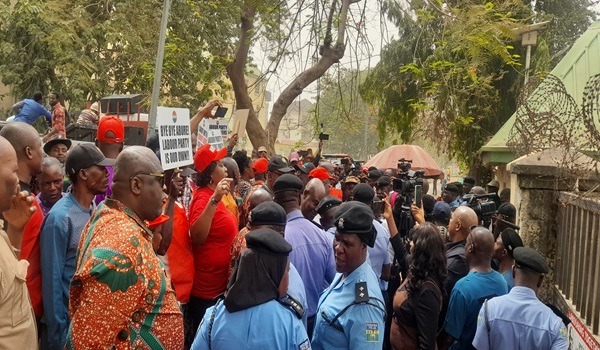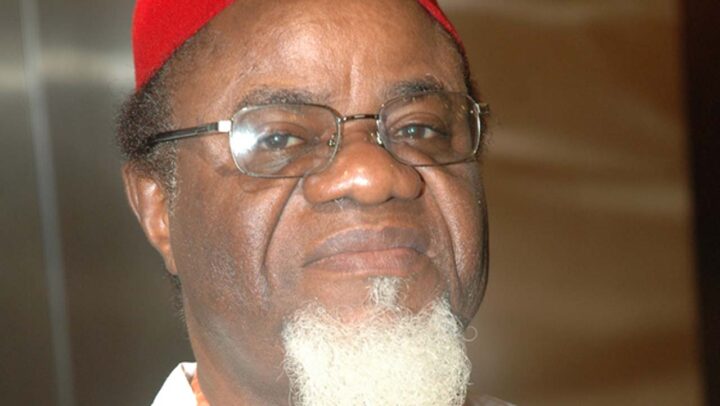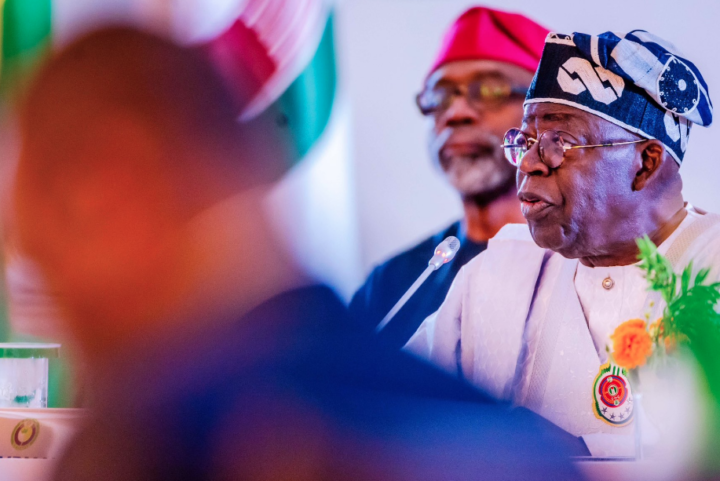When, in their political pamphlet, “The Communist Manifesto”, published in 1848, Karl Marx (my intellectual ancestor), and his intellectual soul mate, Friedrich Engels, made a clarion call: “Oh ye workers of all nations, unite”, it conveyed a message that resonates with the numerous groups of workers around the world. But I have been wondering if Nigerian workers (the organised labour) were among of those, to whom the call was directed.
The theoretical framework of Marxism is anchored around the historical materialist idea that “the history of all hitherto existing society is the history of class struggles”, with the notion that the society is bifurcated along the lines of the “haves”, and “the have-nots”. In the production arrangement in industries, the former are those who own the means of production, while the latter are usually those who have nothing but their labour to offer for a consideration, in the form of salaries and wages.
In their analysis of class consciousness, Marx and Engels described those group of people (workers) who feel that sense of collective deprivation, cum exploitation, as “a class in itself”, which is a mere aggregation of some people with a similarity of socio-economic situations, and commonality of grievances. But until they are able to organise themselves into that conscious group with the willingness, backed by the ability, to change their situations in the system of organising production in the society. Marx and Engels believed only then would they become a “a class for itself”. That is, a class that is conscious of its position of deprivation, and exploitation, and has decided to take its destiny into its own hands. A class that has decided to paddle its own canoe, if its passengers (members) must remain afloat, and sail ashore.
The German philosophers explained that workers first become conscious of sharing common grievances against owners of means of production – the capitalists (thus forming a class “in itself”). And, as time goes on, they’d decide to take things to the next level, by developing that self-consciousness, establishing a social-political movement that will counter the other class that it views as the oppressor who works against the interests of its members. They organise in order to position themselves where they would have a significant say in the appropriation of proceeds from production. Only then could it be deemed to have become “a class for itself”. The above process may be through establishing a political movement (party) that would serve as a special purpose vehicle (SPV) for gaining the control of government in order to implement their ideologies.
Advertisement
Now, let us “Nigerianiṣe” the above postulation by Marx and Engels. The “organised labour” in Nigeria, as represented by both the Nigerian Labour Congress (NLC), and the Trade Union Christmas (TUC), is an organisation representing no fewer than five million workers in Nigeria. Over the years, the vibrancy of the labour union has had impacts (positive or negative) on government policies towards the welfare of the common man, especially the Nigerian worker. This vibrant agitation for improved welfare package for the workers, popularly known as “labour activism” was pioneered by the renowned labour activist of blessed memory, Pa Michael Imoudu, after whom the National Institute for Labour Studies, Ilorin was named. That tradition was sustained up to the recent past, with due respect to the current crop of leaders of the two umbrella bodies – NLC, and TUC. Gone were the days when, if labour spoke, the government trembled. Even during military regimes, the organised labour was considered a constant thorn in the flesh of the junta, and the voice of the voiceless. They represented the “last hope” for the pauperised Nigerians. So powerful was the organised labour then that, they were part of the pillars of the structure that, vehemently, fought for the de-annulment of the famous “June 12” (1993) presidential election — the rock upon which the current democracy, we enjoy, was built. The election adjudged to be the most peaceful, fairest, and freest in the history of Nigeria as a sovereign nation, presumed to have, been won by the late Chief MKO Abiola, was annulled by the regime of the first and only “military President” in Nigeria, General Ibrahim Badamosi Babangida (IBB).
Then, the organised labour and its affiliate unions like the Nigeria Union of Petroleum and Natural Gas Workers (NUPENG), the Petroleum and Natural Gas Senior Staff Association of Nigeria (PENGASSAN), and the Academic Staff Union of Universities (ASUU), were very stoic in their respective resolves to ensure the actualisation of the June 12 presidential mandate, as freely given by the people of Nigeria MKO Abiola. Although, they were unable to get the military junta of the late General Sani Abacha who hijacked the toothless bulldog of an interim government, headed by late Chief Ernest Shonekan then, to de-annul the election, the organised labour was able to underline their importance in the struggle for the enthronement of democracy in Nigeria. That democracy has now lasted for about two-and-a-half decades, and still counting. The organised labour also, in January 2012, collaborated with Civil Society Organisations (CSOs) in resisting an attempt by the then President, Dr. Goodluck Jonathan to, completely remove fuel subsidy. They were that conscious, powerful, and vibrant.
In the light of the above events, it should be a pardonable offence for anybody who expects that Nigerian workers would one day transform their organisational ability, and numerical strengths into weapons of emancipation, against unfavourable government policies, and subsequently, into a robust political movement, that would become that “class for itself” that would emancipate the Nigerian worker from the choke-grip of the bourgeois class, like we have in the UK (Labour Party), Israel, among others.
Advertisement
In 2002, just three years into the current political dispensation, the NLC formed what we have today as The Labour Party (LP). That was a very significant step towards heeding the clarion calls by Marx and Engels in Nigeria. One can only imagine, how formidable a force it would be in the Nigerian political ecosystem, considering the spread, and size of its membership across the country. They have a very strong presence in each of the 774 Local Government Areas, and if they have been staying the course of electioneering, without resorting to endorsing candidates of major parties on the eve of the general elections.
In 2007, some smart politicians, like a former Governor of Ondo State and former minister for housing and urban development, Dr. Olusegun Mimiko, and the immediate past Governor of Edo State and now the Senator representing Edo North, saw these inherent strengths in the Labour Party, bought into it, and have benefited from that massive political asset. While the former contested and won the Ondo State gubernatorial election on the platform of the party, even though he would later defect to the PDP where he came from, the latter did not become a governor on the platform of the party in Edo. He only used their ticket and structure to secure an alliance with the then Action Congress – AC (later Action Congress of Nigeria, ACN, and now, the All Progressives Congress, APC), to win the Edo gubernatorial election. The victories in both cases did not come without fierce, and long-drawn legal battles.
Then in the run-up to the 2023 presidential primary elections of parties in 2022, one of the aspirants in the opposition People’s Democratic Party (PDP), Peter Obi, sensed he would not be able to secure the party’s presidential ticket due to the level of formidability of some veterans in the party, and defected. He, therefore, pitched his tent with the LP, where he secured the ticket with little or no stress. His popularity with a large segment of the youths, who are fed up with the old order, made the move a wise one for him. It birthed what is now known as the “Obidients Movement” – a youth-based political movement made of mostly Generation-Z. Other politicians seeking for political platform devoid of the kind of Nigerian realpolitik that turns a Professor of Political Science into a novice, to actualise their ambitions, followed suit. With that, the party won a governorship seat (Abia State) with Alex Otti, and several other seats in the national assembly, as well as State houses of Assembly. Obi, its presidential candidate, impressively, came third in the presidential election, with no less than six million votes.
As it is customary for most Nigerian politicians, people expected those who won elections on the party’s ticket to defect to the ruling APC. But I am not sure if that has happened yet. Their sole Governor, Alex Otti, the first expected to jump ship, has so far, stayed with the unwritten term of the mandate by remaining loyal to the party as a sitting governor and the only Governor in Nigeria who is neither of the ruling APC, nor of the largest opposition party, the PDP. Political analysts like to refer to the LP as the 3rd force.
Advertisement
One most worrisome issue plaguing the Labour Party capable of torpedoing their achievements, however, is the leadership (and ownership) tussle that has been rocking the party. Shortly after the 2023 general election, a faction led by Mr. Lamidi Apapa started claiming to be the legitimate national chairman following a court judgment restraining Julius Abure and others from parading themselves as national officers of the party. And before anyone could say LP, a party that came third in the presidential election suddenly found itself in a scenario that has, over the years, characterised the being of the two biggest parties in the country – leadership crisis. Since then, the two factions, one belonging to Abure, and the other, Apapa have been enmeshed in a legal battle to take absolute control of the party structure. As Abure seems to appear to be strengthening his grip on the party, and while that battle rages on, the whole thing – leadership and ownership crisis took a new dimension, as the Nigerian Labour Congress, under the leadership of Comrade Joe Ajaero, who had earlier endorsed him, now accused him (Julius Abure) of running the affairs of the LP as a sole administrator. The NLC passed a vote of “no confidence” in the leadership of the national chairman of the party, and as a result, demanded his resignation. The Labour Union, has also, reportedly written a letter to the Independent National Electoral Commission’s (INEC) chairman, Yakubu Mahmood, through its lawyer, Marshal Abubakar, advising the electoral umpire not to monitor the party’s national convention, scheduled to hold today, 27 March in Abia State, saying, the convention is illegal. The Union also reportedly wrote a separate letter to LP’s national legal adviser, Kehinde Edun, threatening to institute a contempt proceeding against the party should it proceed with the convention in disobedience to pending legal disputes. The plaintiffs who filed the case are the NLC, the Labour Party, Salihu Mohammed, Lawson Osagie, Baba Aye, Ikpe Etokudo, Sylvester Ejiofor, Lucy Ofion, and Salamatu Aliyu, while the defendants are Abure and INEC, according to a report by “The Premium Times”. Yes, the crisis has become that serious.
But, there have been questions as to whether the NLC has any right, derivable from either the electoral act 2022, or the party’s constitution, to serve as a body, or an organ superintending over the running of the LP. A look at the party’s constitution, Article 9(1), it lists the president of the NLC and the TUC, as one of the six categories of people who could serve as members of the Board of Trustees (BOT), I am not sure, if that confers an absolute power on Comrade Ajaero to just wake up and demand for the resignation of the party’s national chairman, without other members of the BOT being in support. But it seems, Ajaero sees NLC as a parent to the LP, and therefore, is in a position to call micromanage its affairs, or whip its chairman into line, whenever he “appears to be veering off the track”. To the contrary, some observe that the labour Union should remain apolitical and concentrate its energy on getting the best available deal for its members from the government, and various employers of labour in the country. Or better still, Ajaero should resign from his position as the labour leader, and join politics full-time. Viewed from the prism of Marx’s clarion call, however, LP is a special purpose vehicle (SPV) to actualise the Marxist dream. That is, the need for the workers’ unions to organise themselves into “a class for itself” as postulated by Marx and Engels, by forming a political movement that will contest elections, possibly win, and then take control of the government, thus securing for them, the opportunity of governing in a way that guarantees the utmost wellbeing of its members. It advocates that they come, and fight from within, rather than from without. So it was in line with this postulation that the NLC in 2002 registered the party.
The question now is: are we beginning to see a Nigerian workers’ union that responds to the clarion call? Is the NLC singing from the hymn book – the Communist Party Manifesto? If yes, would it be proper for the leader of the NLC to have such a controlling influence, as Ajaero is purporting, on the party’s leadership, when they might have to be dealing with a national, and subnational governments that are controlled by other political parties in the course of governance and agitation? In such a case, will the NLC still be able to command the needed respect from governments besides the ones headed by the LP? From the look of things, Ajaero’s NLC might be torn between obeying the 2022 Electoral Act, the 1999 constitution on one hand, and the Communist Party Manifesto on the other, and in such a situation might have to choose which one to obey. And in case of a clash, what becomes of him, and his position before the law of the land? Would the Nigerian law be made to assert its superiority, especially, as stipulated in sections 221 to section 229 of the 1999 constitution, or be made subservient to some 19th century Marxist theory? I hope the Imo-State-born labour unionist is well-guided as he makes his decision so that he would not be on record, to have superintended over the funeral of the recent political gains recorded by the party in the last general election.
If the NLC does take absolute charge of the party affairs, will Peter Obi be cool with that? Grapevine has it that Obi is on the verge of quitting the party for another one, to be powered by the Obidients movement, which is the power behind the former Anambra State governor’s strong performance in the last election. We’re talking of an opposition presidential candidate who came third in the 2023 general election with over six million votes. This is something you don’t get regularly, in the highly monetised, and unpredictable Nigerian political ecosystem.
Advertisement
How the Labour Party navigates this juncture of its being would be an interesting sociological proposition for students, researchers, and observers of the contemporary Nigerian political development.
Abubakar writes from Ilorin. He can be reached via [email protected].
Advertisement
Views expressed by contributors are strictly personal and not of TheCable.
Add a comment







